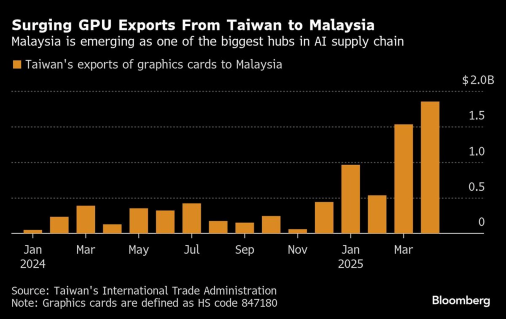In a dramatic about-turn, Malaysia which had just yesterday declared that it would build a first-of-its-kind AI system powered by Huawei Technologies Co chips, had today retracted its remarks without explanation, Bloomberg News reported.
When reached for comment by Bloomberg News on Tuesday, Malaysia’s Deputy Minister of Communications Teo Nie Ching’s office said it’s retracting her remarks on Huawei without explanation. Huawei did not immediately respond to queries from Bloomberg. At this juncture, it’s unclear whether this project will proceed as planned.
Yesterday, Teo had said in a speech that Malaysia would be the first country in the world outside of China to activate an unspecified class of Huawei “Ascend GPU-powered AI servers at national scale.” The country would deploy 3,000 units of Huawei’s primary AI offering by 2026, she said in prepared remarks reviewed by Bloomberg News. Chinese startup DeepSeek would also make one of its AI models available to the Southeast Asian country, she added.
The project had caught the attention of the White House, which had earlier issued guidance warning overseas companies against using Huawei’s Ascend chips. The use of those chips “anywhere in the world” could violate US export controls. The “globally-focused” words were then removed during subsequent tariff negotiations with China.
Malaysia sits in the crosshairs of the two competing superpowers and this latest episode revealed just how delicate the situation is and how serious the White House is in preventing China from planting its AI hardware and chips in data centers across the world. The Trump administration’s fear in part stems from its perception that Huawei is fast catching up with Nvidia.
Huawei’s Ascend lineup is thought to be so far largely confined to use in China by domestic firms that can’t legally access Nvidia’s cutting-edge products. The Ascend chips are quite capable in running AI services, according to industry experts.
As Trump officials hammer out the fine print of the Gulf accords following the President and its tech heavyweight entourage to the Middle East recently, they are also drafting a replacement for former president Joe Biden’s so-called AI diffusion framework. Those regulations expand chip curbs which were originally focused on China. They imposed new license requirements for many countries including Malaysia, as well as national caps on the volume of sales that could be approved, Bloomberg said.
Malaysia is high priority when it comes to the AI supply chain. US firms including Oracle Corp are planning massive data centre clusters in the nation, and are keen to import high-end Nvidia chips for those facilities — in volumes that may not have been possible under Biden-era rules. The regulations barred American hyperscalers from housing more than 7% of their global capacity in any one nation outside the US and a handful of close partners. Oracle was set to blow past that limit in Malaysia, according to the research firm SemiAnalysis.
One element of Trump’s replacement regulations, Bloomberg News has reported, will be chip controls on countries suspected of diverting US hardware to China — including Malaysia. Trump officials this year had pressured Malaysian authorities to crack down on semiconductor transshipment to China.
The Context
In the interest of context, the following is what would have been published before the about-turn news broke out.
“Malaysia has become the first nation outside of China to deploy Huawei’s Ascend GPU-powered AI servers, along with open-source DeepSeek large language model (LLM), at a national level as part of the country’s push for data sovereignty, reports Bernama, Malaysia’s national news agency. At the launch of the country’s Strategic Artificial Intelligence (AI) Infrastructure yesterday, Deputy Communications Minister Teo Nie Ching reportedly said the move marked an important step in the country’s AI development, as localising LLMs like DeepSeek and hosting servers domestically would enhance AI sovereignty.
The data will be stored in servers in Malaysia, managed and used by Malaysians in Malaysia, she reportedly said. Teo was speaking at a press conference after officiating the launch of the Strategic AI Infrastructure: Trusted, Sovereign and Global, in Kuala Lumpur yesterday.
Described as the country’s first complete national AI infrastructure, the platform is designed to empower the government, businesses and universities to leverage AI in improving services, boosting productivity and driving innovation.
At the event, Teo also launched Malaysia’s first sovereign generative AI environment, hosting DeepSeek which is powered by the AlterMatic DT250 AI Server, containing eight high-end graphics processing units (GPUs). The server offers 20% higher performance and 30% energy savings compared to industry peers. Early adopters include the Prime Minister’s Office, Ministry of Communications, Permodalan Negeri Selangor Bhd (PNSB), Cyberview Sdn Bhd and Universiti Teknologi Malaysia (UTM).
Teo also witnessed the launch of the Malaysia-China Trusted Data Zone, the first bilateral corridor linking Cyberjaya, Malaysia, and the China (Shanghai) Pilot Free Trade Zone Lin-gang Special Area, aimed at enabling seamless cross-border AI development through infrastructure, joint innovation platforms and digital capability integration. The data zone is operated by Skyvast Data on the Malaysian side and Shanghai International Data Port Co Ltd on the Chinese side.
Skyvast Data and Leadyo Systems also announced a road map to deploy 3,000 advanced GPUs across multiple infrastructure zones by 2026, supported by a growing ecosystem of Malaysian AI delivery and integration partners.
Leadyo Systems chief executive officer Zhang Yifeng said Malaysia was chosen for the collaboration because the country offers one of the best industrial environments in the region. “There is good bilateral relationship between China and Malaysia, as well as the readiness of the Malaysian market in terms of semiconductor manufacturing, infrastructure readiness, as well as the skill sets of the talents available in Malaysia. That’s why we, and even Huawei decided to select Malaysia as the first country to launch such an advanced GPU [technology],” he said.
Skyvast Data chief executive officer Lim Chee Siong added they have identified data centre clusters in Cyberjaya that were mapped into Shanghai’s Lin-gang while the design phase of a trusted data zone linking Perlis and Shanghai’s Lin-gang had already begun. The Digital Twin Park will be integrated into the Perlis Advanced Tech Park when completed within two years’ time.
In other news, Reuters yesterday reported that Huawei had launched a laptop model with its own operating system called HarmonyOS.
Photo credit: Bloomberg




